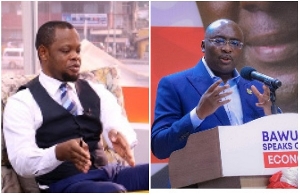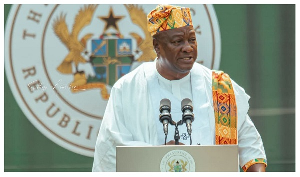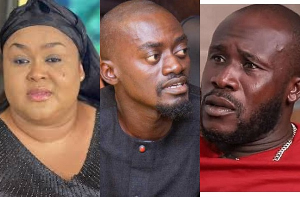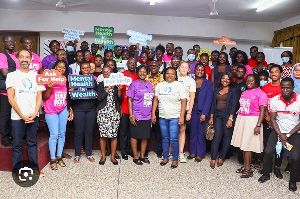Renowned private legal practitioner and law lecturer, Dr. Justice Srem-Sai, has criticized the Flagbearer of the ruling New Patriotic Party (NPP), Vice President Dr. Mahamudu Bawumia, over his promise to amend the Chieftaincy Act to restore the power of chiefs to summon people to their palaces.
In a Facebook post on June 12, 2024, Srem-Sai pointed out that the vice president’s promise is problematic because the part of the Chieftaincy Act that granted chiefs the power to summon people to their palaces, Section 63(d), was declared unconstitutional.
He explained that once the Supreme Court has ruled it is unconstitutional, even the Parliament of Ghana cannot reinstate it, unless the constitution itself is amended or overthrown.
Srem-Sai stated, "A thing is unconstitutional if it offends a principle in the Constitution. So, when the Supreme Court declares something unconstitutional, the thing becomes void; meaning the thing has ceased to exist - as if it never existed in the first place. That’s the first point.
"The second point: when a thing is declared unconstitutional, not even Parliament could, through ordinary legislation, bring such a thing back to life. The reason: Parliament and its laws, too, are under the Constitution. The ways to bring such a thing back to life are to (a) amend the Constitution itself, or (b) overthrow it.”
The Supreme Court had declared Section 63(d) of the Chieftaincy Act unconstitutional in July 2011, which imposed jail terms for those who refused to attend a chief’s summons.
A former paramount chief had petitioned the Supreme Court to make this declaration.
Dr. Bawumia had announced at the Western Regional House of Chiefs on May 2, 2024, that his government would amend the Chieftaincy Act to restore some powers to traditional leaders.
He believed this would enhance the Chieftaincy institution and alleviate local disputes in the courts.
However, Srem-Sai argued that Dr. Bawumia's proposal is legally problematic as it does not involve amending the Constitution or overthrowing it, which are the only ways to reinstate an unconstitutional provision.
Read Justice Srem-Sai's full post below:
A thing is unconstitutional if it offends a principle in the Constitution. So, when the Supreme Court declares something unconstitutional, the thing becomes void; meaning the thing has ceased to exist - as if it never existed in the first place. That’s the first point.
The second point: when a thing is declared unconstitutional, not even Parliament could, through an ordinary legislation, bring such a thing back to life. The reason: Parliament and its laws, too, are under the Constitution. The ways to bring such a thing back to life are to (a) amend the Constitution itself, or (b) overthrow it.
Now to Section 63(d) of the Chieftaincy Act: the Supreme Court declared the Section unconstitutional way back in July, 2011. The Section sent you to jail if you refused to attend a chief’s summons. Interestingly, it was a former paramount chief who saw the evil in the Section, and petitioned the Supreme Court to declare it unconstitutional.
In declaring it unconstitutional, the Supreme Court explained that “chieftaincy is … a part of the contemporary constitutional regime and its incidents must measure up to the standards set in the Constitution.” This means that Section 63(d) does not measure up to the constitutional standards.
This also means that it is not possible to amend Section 63(d) or make another legislation to re-criminalise the refusal to attend a chief’s summons. So, I think, Dr Bawumia’s proposal is, to the extent that it does not call for an amendment of the Constitution or its overthrow, legally disturbed. Inherently.
Granted, however, that he could - why would any leader in today’s Ghana and in the teeth of all the grave problems that confront us as nation, be interested in amending the Constitution or making a law just to make it a crime when a person refuses to attend a summons from any of the over 1000 chiefs in the country?
Watch the latest episode of Everyday People on GhanaWeb TV below:
Ghana’s leading digital news platform, GhanaWeb, in conjunction with the Korle-Bu Teaching Hospital, is embarking on an aggressive campaign which is geared towards ensuring that parliament passes comprehensive legislation to guide organ harvesting, organ donation, and organ transplantation in the country.
BAI/OGB
Watch the latest episode of Everyday People on GhanaWeb TV below:
Ghana’s leading digital news platform, GhanaWeb, in conjunction with the Korle-Bu Teaching Hospital, is embarking on an aggressive campaign which is geared towards ensuring that parliament passes comprehensive legislation to guide organ harvesting, organ donation, and organ transplantation in the country.
Politics of Thursday, 13 June 2024
Source: www.ghanaweb.com

















